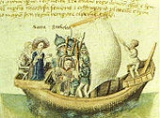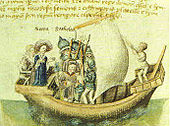
Goídel Glas
Encyclopedia
In Irish
and Scottish
Medieval
myth
, Goídel Glas (Latin
ised as Gathelus) is the creator of the Goidelic languages
and the eponym
ous ancestor of the Gaels
.
 A Scottish version of the tale of Goídel Glas and Scota
A Scottish version of the tale of Goídel Glas and Scota
was recorded by John of Fordun
. This is apparently not based on the main Irish Lebor Gabála account. Fordun refers to multiple sources, and his version is taken to be an attempt to synthesise these multiple accounts into a single history.
In Fordun's version, Gaythelos, as he calls Goídel Glas, is the son of "a certain king of the countries of Greece, Neolus, or Heolaus, by name", who was exiled to Egypt and took service with the Pharaoh, marrying Pharaoh's daughter Scota. Various accounts of how Gaythelos came to be expelled from Egypt—by a revolt following the death of Pharaoh and his army in the Red Sea
, pursuing Moses
, or in terror from the Plagues of Egypt
, or after an invasion by Ethiopians—are given, but the upshot is that Gaythelos and Scota are exiled together with Greek and Egyptian nobles, and they settle in Hispania
after wandering for many years. In the Iberian Peninsula
they settle in the land's northwest corner, at a place called Brigancia (the city of A Coruña
, that the Romans knew as Brigantium).
Ireland
Ireland is an island to the northwest of continental Europe. It is the third-largest island in Europe and the twentieth-largest island on Earth...
and Scottish
Scotland
Scotland is a country that is part of the United Kingdom. Occupying the northern third of the island of Great Britain, it shares a border with England to the south and is bounded by the North Sea to the east, the Atlantic Ocean to the north and west, and the North Channel and Irish Sea to the...
Medieval
Middle Ages
The Middle Ages is a periodization of European history from the 5th century to the 15th century. The Middle Ages follows the fall of the Western Roman Empire in 476 and precedes the Early Modern Era. It is the middle period of a three-period division of Western history: Classic, Medieval and Modern...
myth
Mythology
The term mythology can refer either to the study of myths, or to a body or collection of myths. As examples, comparative mythology is the study of connections between myths from different cultures, whereas Greek mythology is the body of myths from ancient Greece...
, Goídel Glas (Latin
Latin
Latin is an Italic language originally spoken in Latium and Ancient Rome. It, along with most European languages, is a descendant of the ancient Proto-Indo-European language. Although it is considered a dead language, a number of scholars and members of the Christian clergy speak it fluently, and...
ised as Gathelus) is the creator of the Goidelic languages
Goidelic languages
The Goidelic languages or Gaelic languages are one of the two branches of the Insular Celtic languages, the other consisting of the Brythonic languages. Goidelic languages historically formed a dialect continuum stretching from the south of Ireland through the Isle of Man to the north of Scotland...
and the eponym
Eponym
An eponym is the name of a person or thing, whether real or fictitious, after which a particular place, tribe, era, discovery, or other item is named or thought to be named...
ous ancestor of the Gaels
Gaels
The Gaels or Goidels are speakers of one of the Goidelic Celtic languages: Irish, Scottish Gaelic, and Manx. Goidelic speech originated in Ireland and subsequently spread to western and northern Scotland and the Isle of Man....
.
Scotland

Scota
Scota, in Irish mythology, Scottish mythology, and pseudohistory, is the name given to two different mythological daughters of two different Egyptian Pharaohs to whom the Gaels traced their ancestry, allegedly explaining the name Scoti, applied by the Romans to Irish raiders, and later to the Irish...
was recorded by John of Fordun
John of Fordun
John of Fordun was a Scottish chronicler. It is generally stated that he was born at Fordoun, Mearns. It is certain that he was a secular priest, and that he composed his history in the latter part of the 14th century; and it is probable that he was a chaplain in the St Machar's Cathedral of...
. This is apparently not based on the main Irish Lebor Gabála account. Fordun refers to multiple sources, and his version is taken to be an attempt to synthesise these multiple accounts into a single history.
In Fordun's version, Gaythelos, as he calls Goídel Glas, is the son of "a certain king of the countries of Greece, Neolus, or Heolaus, by name", who was exiled to Egypt and took service with the Pharaoh, marrying Pharaoh's daughter Scota. Various accounts of how Gaythelos came to be expelled from Egypt—by a revolt following the death of Pharaoh and his army in the Red Sea
Red Sea
The Red Sea is a seawater inlet of the Indian Ocean, lying between Africa and Asia. The connection to the ocean is in the south through the Bab el Mandeb strait and the Gulf of Aden. In the north, there is the Sinai Peninsula, the Gulf of Aqaba, and the Gulf of Suez...
, pursuing Moses
Moses
Moses was, according to the Hebrew Bible and Qur'an, a religious leader, lawgiver and prophet, to whom the authorship of the Torah is traditionally attributed...
, or in terror from the Plagues of Egypt
Plagues of Egypt
The Plagues of Egypt , also called the Ten Plagues or the Biblical Plagues, were ten calamities that, according to the biblical Book of Exodus, Israel's God, Yahweh, inflicted upon Egypt to persuade Pharaoh to release the ill-treated Israelites from slavery. Pharaoh capitulated after the tenth...
, or after an invasion by Ethiopians—are given, but the upshot is that Gaythelos and Scota are exiled together with Greek and Egyptian nobles, and they settle in Hispania
Hispania
Another theory holds that the name derives from Ezpanna, the Basque word for "border" or "edge", thus meaning the farthest area or place. Isidore of Sevilla considered Hispania derived from Hispalis....
after wandering for many years. In the Iberian Peninsula
Iberian Peninsula
The Iberian Peninsula , sometimes called Iberia, is located in the extreme southwest of Europe and includes the modern-day sovereign states of Spain, Portugal and Andorra, as well as the British Overseas Territory of Gibraltar...
they settle in the land's northwest corner, at a place called Brigancia (the city of A Coruña
A Coruña
A Coruña or La Coruña is a city and municipality of Galicia, Spain. It is the second-largest city in the autonomous community and seventeenth overall in the country...
, that the Romans knew as Brigantium).

